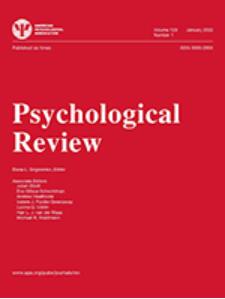Chance as a (non)explanation: A cross-cultural examination of folk understanding of chance and coincidence.
IF 5.8
1区 心理学
Q1 PSYCHOLOGY
引用次数: 0
Abstract
Causal explanations are a key component of human cognition. While we possess certain causal models of the world that offer satisfactory explanations for a range of phenomena, our cognitive capacities have their limits when dealing with the complexities of the world, leaving the causes of many events elusive. In this article, I integrate ethnographic and historical evidence to show that, despite our limited understanding of why certain events occur, people throughout human history and across diverse societies have seldom invoked "chance"-a concept that has gained significant importance in contemporary, modern societies-as an explanation. Instead, they frequently propose putative causal relationships or posit intermediary entities such as "luck" to account for why specific events unfold within their particular spatial-temporal contexts. I discuss the psychological, cognitive, and cultural evolutionary factors that hinder the development of chance-based explanations and argue that the conceptualization of chance as something measurable and its subsequent acceptance as a legitimate explanation emerged relatively late in human history, marking a pivotal intellectual shift with profound implications on how we perceive and manage uncertainty in our daily lives. (PsycInfo Database Record (c) 2025 APA, all rights reserved).作为(非)解释的机会:民间对机会和巧合理解的跨文化考察。
因果解释是人类认知的一个重要组成部分。虽然我们拥有世界的某些因果模型,为一系列现象提供了令人满意的解释,但在处理世界的复杂性时,我们的认知能力有其局限性,使许多事件的原因难以捉摸。在这篇文章中,我综合了民族志和历史证据来表明,尽管我们对某些事件发生的原因理解有限,但纵观人类历史和不同社会,人们很少援引“机遇”——一个在当代和现代社会中变得非常重要的概念——作为解释。相反,他们经常提出假定的因果关系或假设的中介实体,如“运气”,来解释为什么特定事件在特定的时空背景下展开。我讨论了阻碍基于机会的解释发展的心理、认知和文化进化因素,并认为将机会概念化为可测量的东西,并随后将其作为一种合理的解释被接受,这在人类历史上出现得相对较晚,标志着一个关键的智力转变,对我们如何在日常生活中感知和管理不确定性有着深远的影响。(PsycInfo Database Record (c) 2025 APA,版权所有)。
本文章由计算机程序翻译,如有差异,请以英文原文为准。
求助全文
约1分钟内获得全文
求助全文
来源期刊

Psychological review
医学-心理学
CiteScore
9.70
自引率
5.60%
发文量
97
期刊介绍:
Psychological Review publishes articles that make important theoretical contributions to any area of scientific psychology, including systematic evaluation of alternative theories.
 求助内容:
求助内容: 应助结果提醒方式:
应助结果提醒方式:


